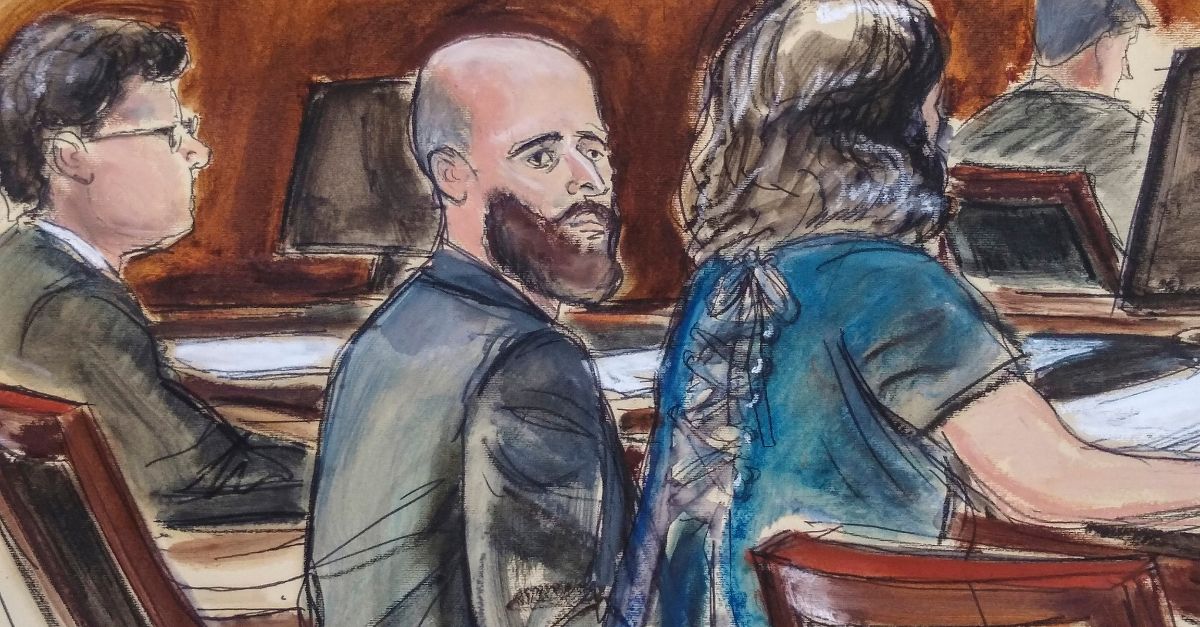
FILE — In this courtroom sketch, Joshua Schulte, center, is seated at the defense table flanked by his attorneys during jury deliberations, on March 4, 2020, in New York. (Elizabeth Williams via AP)
More than a year after he was found guilty of executing the largest leak of data in the history of the CIA — what one judge in New York this week reiterated was a “digital Pearl Harbor” — former spy agency computer engineer Joshua Schulte was sentenced to 40 years in prison.
Schulte, 35, sent a massive swath of stolen data from the CIA to WikiLeaks, which published the records in 2017 under the names “Vault 7″ and later “Vault 8.” They contained, namely, archived copies of classified records on the CIA’s spying tools and techniques, information on its cyberwarfare and surveillance capabilities, and, among other things, details on how the agency was able to hack into web browsers, Apple and Android cellphones and other common devices with internet connections including televisions.
The steep sentence came with a thundering rebuke in court from U.S. District Judge Jesse Furman, according to The New York Times.
Saying he was “blown away, to put it mildly” by Schulte’s remorselessness, the judge told the ex-engineer — who was also found guilty of sending and receiving thousands of child sex abuse materials — he had committed acts akin to a “digital Pearl Harbor” that wreaked “untold damage to national security.”
The damning descriptor was also used in CIA testimony against him at his trial in 2022, court records reviewed Friday by Law&Crime show.

Joshua Schulte LinkedIn profile photo.
Schulte was unapologetic and reportedly opted to spend his time addressing the judge by airing complaints about the conditions of his detention in Brooklyn’s Metropolitan Detention Center including that he had no access to hot water or heat and that his cell was often vermin-filled.
During his first trial, prosecutors argued Schulte was a disgruntled employee, frustrated by a shift in his department’s organization and then further when he had statuses revoked on projects where he was focused on several issues including counterterrorism matters.
He lied about changes he made to administrator systems and abused his privileges by creating back channels to grant himself previously revoked permissions. Once found out, he doubled down and when he was fired, a sentencing letter shows, he boasted that he could “restore my privileges if I wanted to you know, I could do that.”
The leak of hacked data to WikiLeaks leveled the CIA as the classified information proliferated publicly, prosecutors said while citing testimony from Schulte’s trials in 2022 and 2023:
The impact on the CIA was immediately catastrophic. The network used to develop cyber tools was disconnected and the network and every external device connected to it were turned over to the FBI in support of its investigation. Personnel involved in cyber operations had no computer equipment for cyber development.
A number of personnel diverted their resources from developing tools for cyber operations to assessing the extent of the intrusion and the risk and impact of additional disclosures. Further cyber operations were halted and previous and ongoing operations were at risk of exposure. Cyber tools had to be rebuilt and redesigned.
The effect of the WikiLeaks Disclosure was a “digital Pearl Harbor. We were dead in the water.”
Schulte was brazen as he faced down the heap of charges against him. While jailed, he used a contraband phone to access social media and post messages claiming the FBI and federal prosecutors framed him with child pornography charges by loading up his laptop with the images.
Though sentenced to 40 years, prosecutors wanted life.
Schulte has maintained his innocence. His attorney César de Castro told Law&Crime in an email Friday: “We are very disappointed that Mr. Schulte received 40 years imprisonment, however, relieved that he did not receive life imprisonment as strongly urged by the government. We hope that the court’s remarks and findings regarding the conditions of Mr. Schulte’s confinement will reach the ears of those lawmakers and members of the executive branch that can make lasting and needed changes to the Bureau of Prisons’ operations.”
As Law&Crime reported last March, much paperwork underpinning proceedings against Schulte involving the child sex abuse materials charges were kept under seal for some time. Federal prosecutors have steadfastly denied Schulte’s allegations that they set him up.
Schulte has historically argued in court that he was singled out for stealing the classified records. At trials in 2022 and 2023, that motive went unproven.
WikiLeaks received nearly 9,000 documents from Schulte.
Besides the child sex abuse materials charges, he was found guilty of:
- illegal gathering and transmission of national defense information in connection with his theft and dissemination of the Stolen CIA Files
- illegal transmission and attempted transmission of national defense information
- unauthorized access to a computer to obtain classified information and information from a department or agency of the U.S. in connection with his theft of the Stolen CIA Files
- two counts of causing transmission of harmful computer commands in connection with his theft of the Stolen CIA Files.
Have a tip we should know? [email protected]

